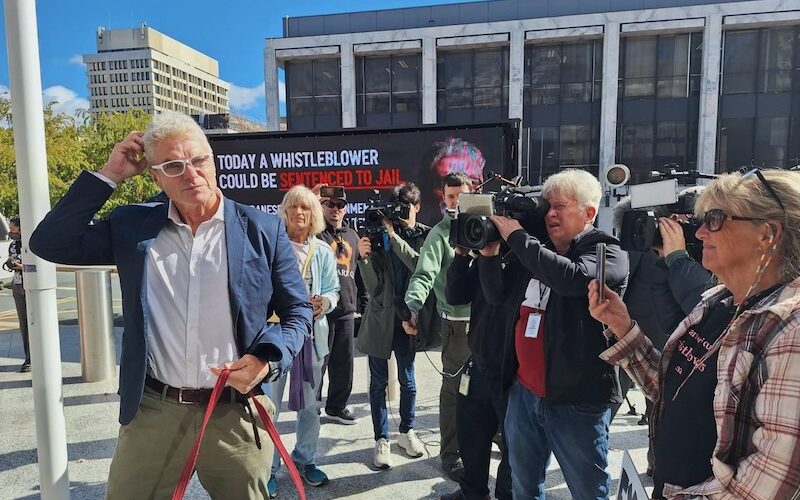A judge has reserved sentencing for Afghan war crimes whistleblower David McBride for a week as Defence lawyers petitioned for jail time.
Does an army lawyer have a duty to simply obey orders or a higher duty to justice and the public interest? Afghan war crimes whistleblower David McBride says the latter. That’s why, he says, he leaked sensitive information to the media about the carriage of legal affairs in the Defence Forces.
The leaks led to ABC’s Afghan files story, and the Brereton Inquiry later found that 39 Afghans were illegally killed during the war. These have never been prosecuted, and the Army command has not taken responsibility. Rather, McBride, the whistleblower, has been prosecuted.
But David McBride was never given the chance to argue his case as Justice David Mossop of the Supreme Court of the ACT struck out McBride’s public interest defence late last year, McBride suddenly had no case to present and was compelled to plead guilty, and today the SAS lawyer faced sentencing and potentially decades in prison for leaking sensitive military documents to the media.
Sentencing has been reserved till next Tuesday morning, May 14.
Ironically, although the public interest case was not heard in last year’s proceedings, it was aired today incidentally as sentencing arguments go to character and motivation.
McBride’s defence barrister, Stephen Odgers, presented the Court with character references as to the integrity of his client, his honour and good intentions. He also said that McBride was suffering from PTSD and mental health issues at the time the material was leaked to the media.
These had affected his judgement, said Odgers, however it did not affect the fact that McBride – although accepting his breach of trust to Army command in leaking the documents – always believed he was doing the right thing.
The Crown argued that the breach of trust of sensitive military information was egregious and that McBride’s leaks presented substantial risks to the military engagement.
An appeal likely if McBride sentenced to jail
If there is a custodial sentence, sources told MWM the defence is likely to appeal on grounds that Justice Mossop’s decision to strike out of McBride’s public interest defence was too narrow, that army lawyers had a duty to the court and the public interest, not just to obey orders if they considered the orders were wrong.
The Court heard that McBride spent years going through the appropriate channels before going to the press, including the Inspector General of the ADF, but felt soldiers were being unfairly treated and that the Army command was more interested in PR than proper legal process.
Odgers parsed psyche reports and character references which demonstrated that McBride had acted with integrity, was “honest and in pursuit of the truth”. After going to the IGADF in 2014 and the AFP after that he “felt that his complaint would fail”. His motivation, said Odgers, was to have the action treated seriously after he had come to a view that internal investigations were not working.
“He was not motivated by personal advantage, but he realised that he and his family would suffer significantly for what he believed was his duty.”
His actions were founded on a “strong sense of duty and honour. He honestly believed that he was not committing any criminal offence”.
He knew he was breaching orders and the consequences of that and that he was exposed to prosecution. But believed that he would ultimately be vindicated and that what he had done was done in the public interest.
He believed what he was doing was lawful because he was acting in the public interest.
“I don’t believe it was a crime,” said Odgers, paraphrasing McBride, “because I firmly believed it was my legal duty.” It was clear from police interviews that he believed that he had disobeyed orders but would not be convicted of any offence because proceedings would clear him as he was acting in the public interest.”
The evidence showed that McBride had developed PTSD in 2011-13 in Afghanistan. He suffered anxiety, said Odgers, and was self-medicating. “There was a deterioration in mental health during the offending period.”
“So I ask your Honour to accept that his offending was partly due to mental disorder – it played a role in his decision making. It affected his judgement and behavioural choices.”
There was an intense emotional response to his concerns about mistreatment of good soldiers was being ignored.
The Crown agreed that there was evidence that he was suffering from some mental disorder.
“It had some contribution, but a small contribution. His mental health problem did not affect his judgement and his decision to participate in the offending.”
Odgers says the Army command was involved with “window dressing” which he suspected involved criminality; that is “command was undertaking improper investigations done for PR purposes, and he found that repellant and believed that he needed this to be properly investigated”. This is why he gave documents to [Dan] Oakes (the ABC reporter).
“His real focus was on the policy decision which had been made to begin those investigations. His motivation was to have an investigation into corruption at the highest levels of the ADF”.
Off the Books: how the Army privatised SAS elite to dark ops outfit Omni
Michael West established Michael West Media in 2016 to focus on journalism of high public interest, particularly the rising power of corporations over democracy. West was formerly a journalist and editor with Fairfax newspapers, a columnist for News Corp and even, once, a stockbroker.

